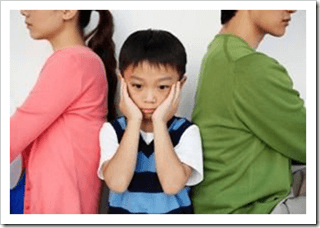
Divorce catches kids in the middle
By Rosalind Sedacca, CDC
Divorce brings up a broad array of painful emotions including anger, fear, resentment and hurt. And when you’re a parent, guilt can surface among your most dominant feelings. For loving parents, guilt can be an incredibly powerful emotion. That’s because divorce triggers our basic beliefs on parenting rules and conduct. Usually when you experience guilt you are feeling bad about a previous action, thought or feeling that you perceive to be wrong. When you cannot let that go you can experience tremendous guilt.
While everyone feels guilty at some time in their life, divorce pushes the guilt button in dramatic ways. And some people are more susceptible. Often those with low self-esteem, tendencies towards perfectionism, the need to be in control or who have difficulty letting go of anger are more riddled by guilt.
Because divorce is such an emotionally and psychologically complex life experience it easily can be a catalyst for guilt. As parents we can beat ourselves up thinking: I could’ve left sooner … been a better parent … paid more attention to my spouse … spent more time with the kids … worked less … tried harder! Thoughts of that nature strengthen our sense of guilt and can lead to depression.
How can you address and move past your guilt? Here are some suggestions that help:
1. Acknowledge that everyone makes mistakes. Release your blame by understanding that you made a choice based on the circumstances before you. You did the best your could at that time. Remind yourself that in the future you will choose to do things differently.
2. Seek out the support of a therapist or divorce coach to help identify why you are feeling guilt and what you can do to ease the pain. Journaling your thoughts can also be insightful in understanding the roots of your guilt and how you can release it.
3. Re-label or reframe your “mistakes” as positive learning experiences. Tell yourself you are growing and benefiting from those experiences and won’t repeat them again. From that new perspective your errors in judgment become stepping-stones toward positive growth, rather than sources of despair.
4. Replace the mindset of “should” and “must with the language of “choose to.” Find ways to delegate to others things you don’t have time for and can’t do yourself. This will help reduce feelings of having to do something due to obligation. That doesn’t mean being an irresponsible former spouse or co-parent. It just frees you from being dominated by guilt so you can choose to be motivated by maturity and consideration.
Are you so attached to your guilt that you enjoy wallowing in self-pity? That becomes a form of self-punishment or self-sabotage. You may derive pleasure from getting extra attention and support from others for your misery. However, that mindset also keeps you stuck – unable to let go and move on with your life. Since you can’t change the past, replaying old drama serves no purpose in setting you on a new track. Instead, put your conscious attention on catching and eliminating any intrusive, unwanted, unpleasant thoughts. Focus instead on happiness-promoting, forwarding thinking ideas. Envision a better future for tomorrow and take action to move you and your children in that more positive direction!
These 4 steps will be of value to you at any point in your life, long after divorce. Replacing guilt with hope of a brighter horizon will serve you well in facing any challenges ahead.
* * *
Rosalind Sedacca, CDC is the founder of the Child-Centered Divorce Network, a Divorce & Co-Parenting Coach and author of the acclaimed ebook, How Do I Tell the Kids About The Divorce? A Create-a-Storybook Guide To Preparing Your Children — With Love! To get her free ebook on co-parenting success, coaching services, expert interviews, programs, e-courses and other valuable resources on divorce and co-parenting, visit: http://www.childcentereddivorce.com
Please share this article on social media!




